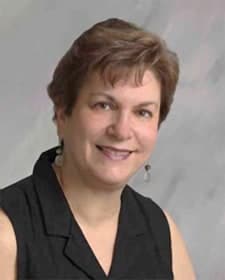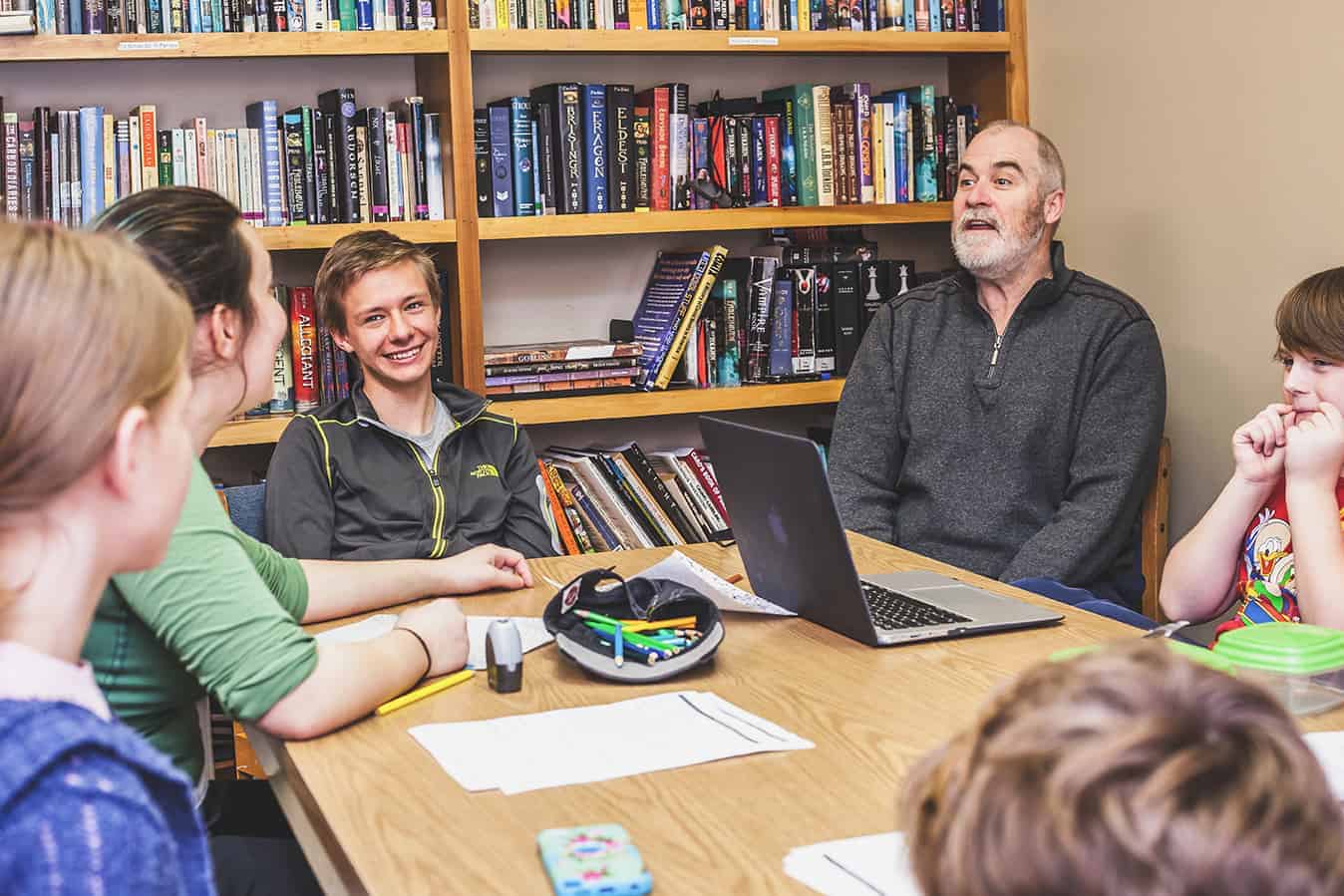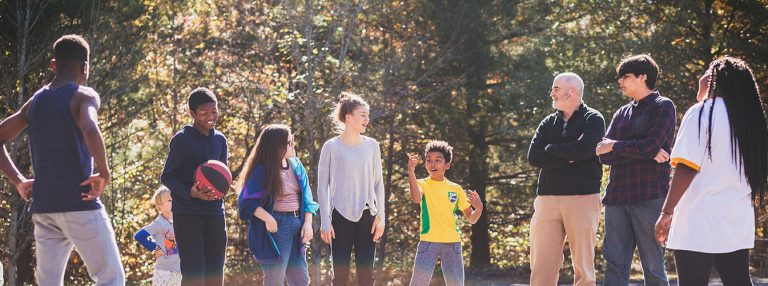The Challenges and Rewards of Trusting Children

By Mimsy Sadofsky, co-founder and staff member of Sudbury Valley School in Framingham, Massachusetts. This blog post was featured as an article on Fairhaven School’s previous website.
I have been working at Sudbury Valley School since my kids were little. They are older than many of you are now, and those of my grandchildren that are old enough to go to school are going to a school like Fairhaven, and like SVS, in Oregon. So it is clear to me: I trust children. My children trust children. I even trust grownups.
But what do I trust children – and even grownups – to do? Well, let’s set aside “get their own education,” because it seems so abstract, and talk about something a little easier to see: learning.
People learn. You learn. I learn. We all do it every day. But, as we have seen if we have seen babies or toddlers in action, we don’t learn as fast, or perhaps as compulsively, when we are adults as we did when we were kids.
However, we do tend as adults to have more “wisdom”. We have a lot bigger knowledge base, just by the fact that we have been around for a long time, to measure what we learn against and to filter out what we can’t use.
Imagine for a moment being little, maybe four or five or six, and being in a situation where you had acres and acres to roam around on, where there are other children your age and where you had a profusion of eight year olds, ten year olds, 15 year olds, and even 35 year olds to interact with every day while you were making friends, figuring out what kinds of games to play with your friends, and generally having a blast. Do you think you would be learning in that situation? I think that not only would you be learning, you would be learning at an almost incapacitatingly fast pace. That is, you would be learning to exhaustion, just as you did when you were two years old and driving your parents nuts with your constant activity, questions, explorations both physical and intellectual.
Children and Responsibility
I also trust them to do something else besides soak up knowledge: I trust them to be able to be responsible for themselves. There are few places that trust five year olds to be free. Most people are sure they can’t handle the responsibility. Most people are absolutely certain that a five year old who is free does not have enough judgment to take care of himself. At our school we have some pretty simple little “tests” of that judgment; most kids pass with flying colors, and theirparents know that they will before they enroll: they have to be responsible about not going in the street or in the parking lot; they have to be trusted not to play with fire; they have to be trusted not to drown or wander off campus. (We tell them the boundaries.) After that, judgment flourishes. A child who is trusted to jump from boulder to boulder because the school trusts that he won’t jump unless it is safe, develops trust in his or her own decision-making abilities. Is that more important than learning good handwriting? I sure hope so, because very few of them learn good handwriting in this day and age, and all learn to trust their own ability to make decisions.
So it is easy to trust that those children will learn. It is easy to trust that they will accumulate wisdom as quickly as possible. Wisdom comes from piles of experiences. Constant challenges give life meaning for all of us.
Why do people not trust children? Not so much because they are afraid children will not learn, but because they are afraid they will learn the wrong things. Whatever those are. And afraid that they will fail to learn the right things, whatever those are.
I submit that children moving around freely in an emotionally supportive, intellectually rich, and physically interesting place will figure out what the right things are for them, and will go after them full bore. That is what we see in Sudbury schools all the time, and this is what we should see, because a human being is born trying to become a high functioning adult. A human being is born curious. All she needs is to see what high functioning adults are like, how they live, how they work, what they talk about. And then he aims his whole development at it.
We realize when we take the time to think about it that we are born struggling to survive. And survival for us means something quite sophisticated because the world is extremely sophisticated. But think about it: these are Information Age children. I don’t think that children who were born before the Information Age were less capable of figuring out what they needed in life; just that they did not have the same intensity of stimulation as children growing up today. I watch my little three year old grandson practically crawl into the computer. I see him on live video chat every week, because he lives in Germany and our time zones are kind of different. He needs to see every site that has lots of pictures of trucks, or trains, or wild animals. He needs to type. Desperately. “Thomas, Percy, Henry, Cranky” are the words he spells. Perhaps some of you recognize that need. This is not a child who needs instruction to learn. Nothing can stop him, and he is not any different than other children.
Learning the Right Things
Will they learn the right things? What the heck are the right things? Could there be one set of right things for all children, even children in America, even children in the megalopolis of the Eastern Seaboard? Of course there isn’t. A musician doesn’t need to develop the same skills as a physician, necessarily, just an overlapping set so they can communicate with each other. And the musician does not, if not interested, need to begin to develop his foreign language skills like someone destined to become a translator. Does everyone need to learn history? Well, sure. But what history? How much and whose account of it? When? Free children living in democracies seem to crave it. How much does every single child need to know about geometry? Or even algebra? Not that much for many of them to have extremely fulfilling and highly successful lives as adults. Even often as adults with several layers of degrees from higher education.
That is heresy in most schools. But not here. Here children are free and are trusted to keep using their heads all of the time without anybody hammering away at those heads to make sure that particular bits of knowledge are rattling around in them. When you think about that, why not trust children? You can’t stop them from learning. What you are trusting them to do is stay alive to the world around them and thus maximize their chances for learning. And we think that play, which is the most exciting kind of mental activity anyone engages in, is the way to maximize their chances.
Take your average Sudbury school nine year old. Some will know the times tables; some won’t. Some will know the capitals of the states; some won’t. Some will know the gross national income of an average Venezuelan, most won’t. But of the ones that do – how long will they remember? Of the kids who learn their times tables, it is because it is vital to them to understand the world mathematically – some people in my family think that is a possibility – and they will remember them. Of the kids who are interested in geography and learn things about the country and the world because they are excited about that, the level of retention will be remarkable. Of the kids who are forced to learn such things in classrooms? Temporary at best. And do they necessarily have any organization to what they learn? Self-organizing is what Sudbury kids are. A little dicier with the others… It is a lot easier for free children to understand that they are the masters of their own fates; that they can control their lives.
So take that nine year old again. Take her out to a party with only adults. How well does she interact? How useful are those adults to her? Does she treat them like people? Or does she act like she can only be comfortable with other children approximately her own age? The sudbury school kid can talk to me or you or a four year old. The traditionally schooled kid usually has very little common ground with adults who are not his or her parents. That narrows down the learning process a lot, doesn’t it? So it is harder to trust the ones who have not been set free! And this means that while you may have an eight year old that doesn’t read yet, when you set him down in a room full of adults, he will not come across as lacking knowledge; he has spent the time he might have spent turning into a “learning disability” when indeed there is no disability, just a timing discrepancy, soaking up information like a sponge.
I want to go back to something I said a minute or two ago: kids who are truly trusted are very alive. They trust. They look for what they need from other people or other sources in a very natural way, which also opens up their opportunities for learning.
Do all of you know what the Judicial Committee is? And how it works? In our schools we often have extremely young children who must sit each day for a month, for as long as it takes each day – maybe 45 minutes, maybe 2 ½ hours, to delve into complaints, figure out what happened, sort out stories to try to find the truth, maybe decide if someone broke a rule, find out if they agree that they did, figure out how to sentence them if they did. Sometimes seven year olds are making these judgments. Sometimes five year olds. And the remarkable thing is that they do it. They are not behavior problems. They are clearly focused on the work. And they have suggestions and input that is useful.
Children and Parents
So what does all this trust produce? Obviously, people who are competent. People who are in control of their lives. People who know they can change what they don’t like in their own lives. People who are lively and fun. And last but maybe not least in this particular parent-oriented group: people who don’t have to rebel in order to get freedom, so that they stay close to their parents, and develop close relationships with other adults, without going through a period of alienation, hopefully.
Being a parent is darn hard. There are few jobs as difficult. You feel so responsible for the young life that you have created, and thus feel that you have to give it a lot of guidance. And you do have to give that child guidance. The kind of guidance that comes from making clear what your own values are, and living them. The kind of guidance that comes from making the child feel valued and feel that his ideas are valued. The kind of guidance that comes from a nurturing stable home. But what you don’t have to give them is a lot of molding. You have to let them grow up to be who they are destined to be, and that is very hard. It is hard to let go. It is hard not to worry about each and every step, especially when people are telling you that if you let a child take steps on her own they can fall, tragically, and fall tragically “behind”, whatever that means. They fall, and fail, a lot and learn a lot from picking themselves up and starting over.
But keep in mind that no one has more influence on everything about your child than you. That they read your thoughts and emotions without you telling them often. And they want to please you. So if you can allow their own natural development to please you, then everything should go well. If they feel your anxiety about their own personal timetables – for instance that eight year old who doesn’t quite read yet–it is hard for them to develop the confidence to allow their natural abilities to develop, to live by their own personal timetables. (Not times tables!!)
Teens
I want to talk about a problem that many parents are worried about; teenagers. Usually if you have teenagers who started in this school as young children, you are not too worried. You may see them beginning to doubt themselves in adolescence, but if you can hold the reasons that you sent them to this school as your model, they will too.
But if they come here as teenagers, wow. Sometimes it seems like they have fallen into a pit. They will extricate themselves, almost certainly. But they will extricate themselves very much better, and very much sooner, if you can have confidence in that ability. Just keep telling them you love them and that they can do it. Eventually they will. But steel your nerves. It is not easy to see what most people see, because you can’t see into your kid’s mind even if they can see into yours, which is a child who seems to be stalled. They have to confront emptiness before they can figure out which way to go. They have to sort of empty their minds of all of the expectations teachers, counselors, other well-wishers, have filled them with. Then and only then, they can begin to grow fully into who they are. So just sit tight and be supportive through the months and months of struggle–the kids are struggling a lot more than you are–there is a beautiful sunrise at the end of that tunnel.
The Examined Life
Back to getting an education: an examined life is about the most important thing we can wish for our children. That has not changed since Plato wrote about Socrates! One of the guaranties you get – and you don’t get all that many – when you send your child to school here, is that they will grow up to lead an examined life. They will be competent and able to forge their own paths. They will have values, and know their own values, and live their own values. One of the reasons they will is because of the kind of exposure that led the person speaking below to find a career as a staff member at Sudbury Valley.
“I am very attached to the realm of activities which are usually classified as “academia”. I always tell people that the main reason I went back to Sudbury Valley as a staff member is that I have never been in a more intellectual community in my life. I have never seen another place where people would talk about everything starting from first principles, and mean it – and not for grades. People are in the conversations because they want to be there. They’re not trying to impress anyone with their knowledge, they’re not trying to win praise, they’re just talking about these things because they’re so interested. I wanted an intellectual community, I wanted to be part of that kind of give-and-take, and I really have seen very little of it outside of Sudbury Valley, although I’ve been to a lot of universities.”
I am going to end with two quotes that sort of sum up why I trust children. They are from interviews with SVS alumni. The interviews were part of a long, in depth study of our graduates to try to find out what kinds of lives they have; whether they were impeded in any way by their bizarre educations, etc. It is published in a book called Pursuit of Happiness.
“I think the one thing I got out of Sudbury Valley was, ding! ding! ding! I got the clue – light – I am responsible for my own outcome! The day is good when I wake up. I can screw it up if I want, but I can do something good with it if I want. That was the main thing I learned at Sudbury Valley, I am responsible for myself. No one else is. That definitely stayed with me and will be imparted to my own kids. ”
“Sudbury Valley School gave me a chance to really look inside myself and see what I was about. It also gave me a chance to learn about other people and how they act in situations when they’re in control of their day, and they’re in control of their life.”


